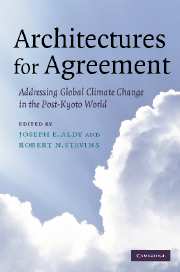Book contents
- Frontmatter
- Contents
- List of figures
- List of tables
- List of contributors
- Foreword
- 1 Introduction: International policy architecture for global climate change
- Part I Targets and timetables
- 2 Formulas for quantitative emission targets
- 3 Graduation and deepening
- Part II Harmonized domestic actions
- Part III Coordinated and unilateral policies
- Part IV Synthesis and conclusion
- Glossary and abbreviations
- Index
3 - Graduation and deepening
Published online by Cambridge University Press: 05 June 2012
- Frontmatter
- Contents
- List of figures
- List of tables
- List of contributors
- Foreword
- 1 Introduction: International policy architecture for global climate change
- Part I Targets and timetables
- 2 Formulas for quantitative emission targets
- 3 Graduation and deepening
- Part II Harmonized domestic actions
- Part III Coordinated and unilateral policies
- Part IV Synthesis and conclusion
- Glossary and abbreviations
- Index
Summary
Introduction
The Earth is warming rapidly. Over the last twenty-five years, global surface temperatures have increased by almost 0.5°C and reached levels not seen at least for the last millennium. The impacts of global warming are increasingly visible and range from longer vegetation periods over retreat of mountain glaciers to a shrinking of the area covered by sea ice in the Arctic. The specter of extinction of polar bears due to disappearance of their habitat is a powerful symbol used by environmental organizations to mobilize humanity to fight climate change.
As global warming proceeds, the political discussion about its causes and countermeasures intensifies. Owing to the tireless efforts of thousands of scientists, the world's knowledge on climate change has been compiled in the Assessment Reports of the Intergovernmental Panel on Climate Change (IPCC). Since 1990, three Assessment Reports of thousands of pages each have been published and the fourth is due in 2007. Their message has become increasingly clear: global warming is due to humankind. Ever since the Industrial Revolution in the late eighteenth century, burning of fossil fuel and industrial processes have led to emissions of greenhouse gases (GHGs) such as carbon dioxide, methane, and nitrous oxide. Over the last two centuries, emissions of these gases have increased dramatically. The wealthy societies of the early twenty-first century are built on economic systems where greenhouse gas emissions are ubiquitous. It will be a huge challenge to achieve the transition to a low-carbon economy.
- Type
- Chapter
- Information
- Architectures for AgreementAddressing Global Climate Change in the Post-Kyoto World, pp. 81 - 130Publisher: Cambridge University PressPrint publication year: 2007
- 4
- Cited by



